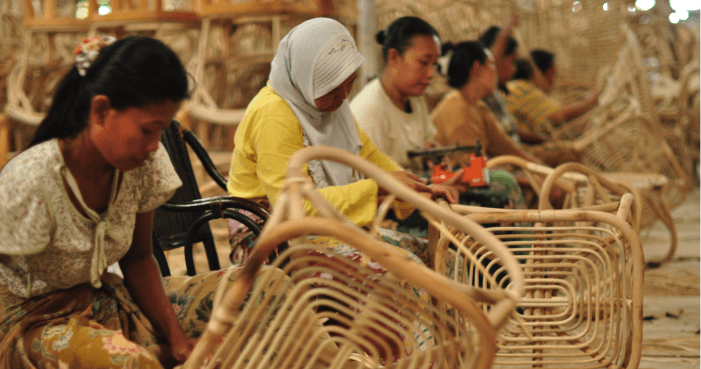It should be recognized that the role of Small and Medium Enterprises (SMEs) in the country’s economy is enormous. SMEs have become the largest employer for people in all corners of the country, which actually determines the welfare of people’s lives. If the sustainability of SMEs is threatened, then the welfare of people’s lives is also threatened. Not surprisingly, SMEs have also become the driving force of the Indonesian economy which has proven to be able to restore the national economy during the pandemic.
However, the reality is that there are still many obstacles that still hinder the development of SMEs in Indonesia. Not only from the side of the SMEs, the government and the wider community also have a stake in the situation. We can no longer turn a blind eye to the problems still faced by many SMEs in Indonesia and continue to allow our country to be “colonized” by other countries with imported goods because imported products in the country can have a major impact on SMEs, the wider community and the government. If not resolved immediately, this problem will affect the welfare of society.
The majority of Indonesians still depend on the sustainability of SME businesses, and use them as a source of livelihood. Data from the Ministry of Cooperatives and SMEs (KEMENKOPUKM) itself states that there were 64,194,056 SMEs in 2019, which in size make up 99.99% of the total business population in Indonesia, and employ 96.9% of the total workforce.
In brief, imported products that are sold freely in the market both legally and illegally can have the following impacts: (1) causing fluctuations that encourage people to prefer imported products because of cheaper prices, (2) lack of income from the sale of local products makes SMEs reluctant to invest in the long term to maintain their business so that production productivity decreases, (3) reduced income of labor involved in the production process.
To maintain the sustainability of SMEs and avoid worse impacts, all parties including the community (consumers), SMEs themselves (producers), and the government (policy makers) can actively participate. First, as consumers, people can prefer, buy, and use local products. Second, the government as a policy maker can start considering various trade policies that are pro-SME. One of them is by implementing a market intelligence strategy that refers to the real data in the market. The government can also start creating special programs for SMEs to stimulate their interest in investing in their business for the long term.
Finally for SMEs as producers. The first is to know and understand where the business is currently positioned to map the challenges and find the most effective solutions in increasing business productivity to the maximum. There are five categories of SMEs that have challenges and solutions, respectively newcomer, artisan, emerging, challenger, and mainstream. Furthermore, SMEs can launch effective system development strategies. One of them is to provide skills training to workers and utilize technology to speed up production to increase business productivity. Combining cloud manufacturing with factory production can also be considered as an effective and efficient step to reduce production costs and make production more flexible and scalable. In addition, for business expansion, SMEs can also partner with logistics companies to distribute products to accelerate the fulfillment of market demand. This step has been proven to expand the SMEs’ market reach to other cities and regions in Indonesia.
If the various solutions above have been carried out continuously, then great benefits will be felt by all levels of society. The development of SMEs will not only impact the SMEs themselves, but will also directly impact the welfare of the wider community. Domestic production will create many jobs, which in turn will sustain various streams of benefits for society. However, to achieve this prosperity, it is not enough that SMEs alone are trying to move. It takes the help of many parties involved to support the sustainable development of SMEs to be able to compete globally, to realize a more advanced Indonesian economy.
This article is adapted with the author’s permission from an article previously published by the World Economic Forum. COSMOS fully supports research and articles that are published with the aim of aligning with our vision and mission; to advance SMEs and realize Indonesia’s economic prosperity.
Reference Source:
Tirta, Arip & Prasanti W. Sarli. 2021. “How Can Indonesia Break Its Vicious Cycle of Cheap Imports?”. World Economic Forum.
Tirta, Arip & Prasanti W. Sarli. 2021. “Indonesia’s SMEs Hold The Key to Growth. How Can They Scale Up?”. World Economic Forum.
Tirta, Arip, Prasanti W. Sarli & Iqbal Muslimin. 2022. “How Local Hijab Producers Could Make An Economic Impact in Indonesia”. World Economic Forum.




